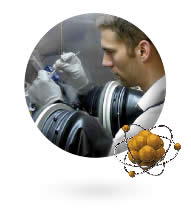
Adam James
UTAS School of Chemistry
Synthetic Chemistry
I've always liked exploring. When I was a young boy, I used to enjoy going for walks in the bush near my home – crossing creeks and climbing rocks and trees to get to new places. I always liked to imagine that I was the first person to be in that place and to see those sights. As I grew up, I started to realise that the chances of discovering somewhere new or being the first to see something are pretty small. Then I discovered that this is exactly what scientists get to do!
I have a natural curiosity about the world around me and tend to find it's pretty rare that I'm not actively thinking about something or having new ideas. When I think about science and how I might discover something new, I realise that it is scientific ideas that have to come before discovery – otherwise how would we know where to look?
I now know that a scientific idea is called a hypothesis and that science is about designing tests (experiments) to see if the idea (hypothesis) is true. By understanding the science already done in my area of research, I can develop a hypothesis that has not been explored, do an experiment or seven, and find that I am the first person to discover something!
 My area of research is synthetic chemistry, which means that I make new chemicals, rather than analyse known chemicals. In chemistry, it's important to use pure materials so that I know exactly how much of each substance is present. This way, if my experiment gives a result different from the hypothesis, I have all of the information that I need to work out what has happened. Whilst getting an unexpected result may sound bad, it's actually often very good – as it means I have learnt more than I expected to about the thing I am studying. It's like bonus knowledge!
My area of research is synthetic chemistry, which means that I make new chemicals, rather than analyse known chemicals. In chemistry, it's important to use pure materials so that I know exactly how much of each substance is present. This way, if my experiment gives a result different from the hypothesis, I have all of the information that I need to work out what has happened. Whilst getting an unexpected result may sound bad, it's actually often very good – as it means I have learnt more than I expected to about the thing I am studying. It's like bonus knowledge!
I love chemistry because I get to work with highly reactive chemicals, some of which catch fire if they touch either air or water. But this also means that I have to be very careful about purifying my chemicals before I begin work and that I must work carefully so that I don't break any containers or spill anything. With very reactive chemicals I work inside a sealed glove-box which has an inert gas atmosphere so that the chemicals can not react with the air in the laboratory. Even with these difficulties, the reward of making something that no one has ever made before makes the time and effort well worth it!
Find out more about chemistry at www.utas.edu.au/chem
